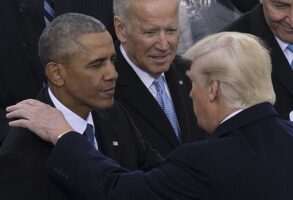Published December 13, 2013
About the only thing the two parties agree on, in fact, is that such partisanship is lamentable—and that the other party is to blame. During the battle last fall that led to a government shutdown, House Speaker John Boehner said it was “a shame that the president could not manage to rise above partisanship.” President Obama has decried “the refusal of some folks in Congress to put country ahead of party.”
This bipartisan contempt for partisanship has deep roots in American history. In “The Federalist,” Number 10, James Madison famously responded to the worry that the American republic, like its ancient predecessors, would be a means for permanent factions to pursue their private interests instead of the public good—putting party ahead of country. And in his farewell address to the nation in 1796, George Washington warned against “the baneful effects of the spirit of party,” which “serves always to distract the public councils and enfeeble the public administration.” Yet in the founders’ time, as in our own, dreams of rising above party often yielded to sharply polarized realities.
Most important, today’s fashionable anti-partisan impulse misses something crucial about parties in a modern democracy. The point was best articulated by Edmund Burke, the 18th-century British statesman and political thinker. Parties, he insisted, aren’t the same as factions. A faction is bent on its own self-regarding advantage, but a party “is a body of men united for promoting by their joint endeavor the national interest upon some principle in which they are all agreed.” A party’s members are unified not by a private interest they want to advance but by a shared view of the good of the nation as a whole. Party differences are disagreements about the common good—not petty, selfish squabbles.
Burke’s point should appeal, above all, to the conservatives who are his intellectual heirs. Such differences about the common good are unavoidable in a free society, Burke thought, because they result from the inherent limitations of human knowledge. Technocrats who imagine that statesmanship involves applying expertise to straightforward practical problems might be able to imagine a post-partisan future in which politics is a kind of applied science. Some of Burke’s opponents—such as Thomas Paine, the radical writer and activist who was perhaps his foremost foil—argued that, in a rational political system, parties could only distract the people from the truth.
But Burke saw politics as a matter of judgment, not science. He believed that the citizens of a free society would usually divide into two broad dispositions toward politics, based on rival notions of the public weal: One group would tend to be grateful for the good in society and want to use it to address the bad, while the other group would tend to be outraged at the bad and eager to uproot it and start over.
This would lead to two different approaches to governing and different answers to particular public questions. Individuals might not feel perfectly at home in either party, but Burke thought that politicians and citizens should stand together with those whose views were most akin to their own. Otherwise, they could never hope to achieve anything. As he wrote, “No man, who isn’t inflamed by vainglory into enthusiasm can flatter himself that his single, unsupported, desultory, unsystematic endeavors, are of power to defeat the subtle designs and united cabals of ambitious citizens.”
None of this means that every camera-ready partisan diatribe on cable news is an act of high statesmanship, but it does mean that pursuing a common cause through common effort with like-minded citizens—even those inclined to diatribes—is the only way any of us can advance our vision of the good society.
Burke’s humility about the knowledge and power of any individual led him to think that parties weren’t only unavoidable but good. It also put him in one party rather than another—in the party of humble gratitude and cautious incrementalism. His case for partisanship is most likely to persuade contemporary conservatives, for similar reasons. After all, the alternative to today’s partisan debate isn’t high-minded deliberation among toga-clad Romans; it is modern technocracy—the rule of experts who think they know enough to manage society from the center.
Burke thought that the experience of working together toward common goals—of turning general principles into particular policies and trying to persuade the public of their wisdom—would help make partisans more responsible and effective. He saw partisanship as the path to statesmanship, not to vitriol and gridlock. Partisans who help each other remain focused on a shared vision of the common good, rather than on momentary political advantage, might just advance the national interest and their party interests at the same time.
That seems awfully optimistic amid contemporary Washington’s partisan din. But it offers a goal as much as a hope. Since partisanship isn’t going anywhere, liberals and conservatives alike would be wise to make the most of it.





